It is somewhat uncommon for a father and a son to share the same idol. Generational differences often create interests and tastes that are disparate to the point of generating mocking comments and eye rolls from the younger of the two. Whether it is in music, films, food, or fashion, agreement and consensus is often a futile exercise.
However, for Max Domi and his father Tie, also an NHL player whose career spanned 16 seasons with the Winnipeg Jets, New York Rangers and most famously the Toronto Maple Leafs, there is unanimity. They both idolized the same hockey player but for very different reasons.
Related: Max Domi Aims to Inspire Hockey Players with Type 1 Diabetes
Tie Domi was known as a grinder who constantly looked out for the on-ice well-being of his teammates. As the all-time penalty minutes leader for the Maple Leafs, he has the statistics that demonstrate the type of role he had. As a young hockey player, he worshipped tough players who were seen as leaders. Bobby Clarke, the legendary captain of the Philadelphia Flyers, epitomized the approach to the game that he admired. So enamored was Domi with his hockey idol that, as a kid, he actually knocked out his own front teeth to look like him.
For Max Domi, the idolization of Clarke came from the fact that, in addition to a shared passion for hockey, they had another common bond – they both have Type 1 diabetes. In a recent book entitled No Days Off – My Life with Type 1 Diabetes and Journey to the NHL (published by Simon & Schuster), Domi writes about the daily life challenges associated with Type 1 diabetes. The book is an inspiring account of how one can achieve a life goal while confronting what appears to be an insurmountable obstacle.
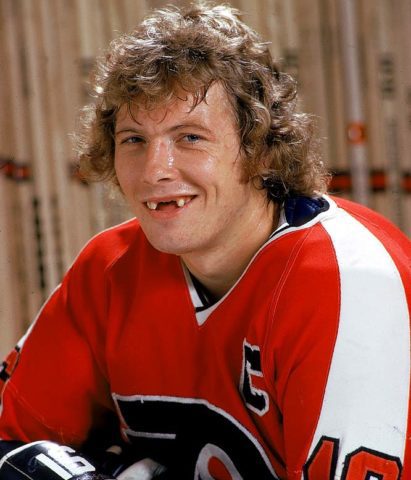
It is the story of a hockey journey narrated alongside the challenges of living with a disease that dominates one’s thinking and everyday actions. Echoing his involvement with the Juvenile Diabetes Research Foundation (JDRF), Domi’s aim with the book is to help others with tips on how to navigate the ups and downs of life with Type 1 diabetes while still achieving one’s goals and objectives.
The book offers an intimate picture of how one can live with a disease that creates a constant battle for balance – the chemicals within your body, the food you eat, the sleep you get and the medication you take. All these aspects need to find an equilibrium, just like the preparation hockey players go through during a grueling season filled with games, practices and constant travelling.
The release of the book is a good pretext to take a closer look at the Montreal Canadiens centerman’s unique path to the NHL.
Growing Up with Hockey
Max’s early childhood was heavily influenced by his proximity to professional hockey. He remembers the hours he used to spend at Maple Leaf Gardens or the Air Canada Centre (now Scotiabank Arena), closely observing “daddy’s work” (as referred to on p. 208 in Tie Domi’s book Shift Work published in 2015 by Simon & Schuster).
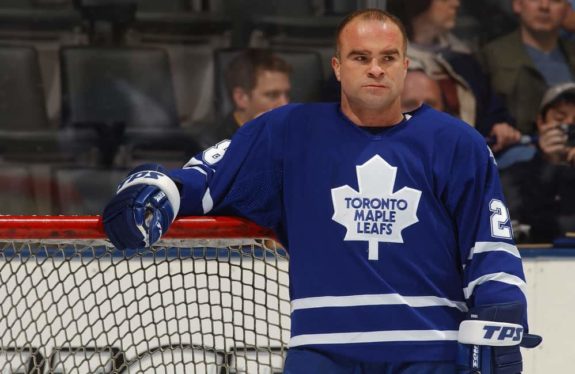
Unlike most kids his age whose eyes light up at the sight of professional hockey players, Max found himself regularly in their presence. In fact, he would, from time to time, actually receive hockey-related advice from Hall of Fame players such as Mats Sundin, Mario Lemieux and on one occasion getting faceoff tips from Mark Messier.
Of all the players Max had the benefit of being in close contact with, it is Sundin who had the greatest impact on him. He writes in the book about a vivid memory of seeing Sundin alone in the gym on the stationary bike following a Leafs game after everyone on the team had left. The image of Sundin being completely dialed in and training hard after a game was incredibly impactful for the young Domi. It is an image that left an indelible mark on him as to the significance of hard work even to the most talented of players.
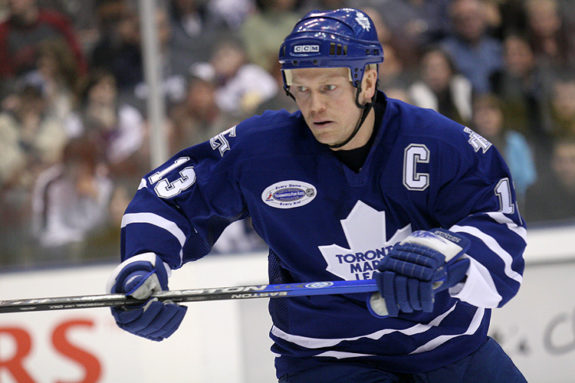
It is therefore of little surprise that becoming an NHL player fueled Domi’s deepest passion and dreams. But suddenly, as with many things in life, the path to the accomplishment and the excitement of that goal became uncertain.
Can I Still Play Hockey?
In the spring of 2007, at age 12, the youthful energy and effervescence of future dreams of glory were put into question. Sitting in a doctor’s office with his mom, Max was told that he had Type 1 diabetes.
That news hit me hard. A week before, all I’d worry about was whether we’d win our next game. Now the doctors were telling me I was living with a potentially deadly disease.
Max Domi’s reaction to the diagnosis of his type 1 diabetes – excerpt from No Days Off, p. 25.
Not knowing exactly the meaning of such a diagnosis and consistent with Max’s youthful obsession with his favorite sport, he took the news in stride. “Can I still play hockey?”, were the first words Max could say, signaling the main concern floating in his young mind. It is at that point, in the doctor’s office, where Domi was first introduced to the story of Bobby Clarke.
Hockey became one of his outlets in dealing with difficult life events such as his disease and the divorce of his parents when he was 11 years old. It was a lot to deal with for a young boy. However, he continued to focus on hockey.
The symbolism of now worshiping Bobby Clarke went a step further when Max started to play for the AAA Don Mills Flyers. He changed his jersey number from 13, in recognition of Sundin, to 16 as an honor to his newfound hero.
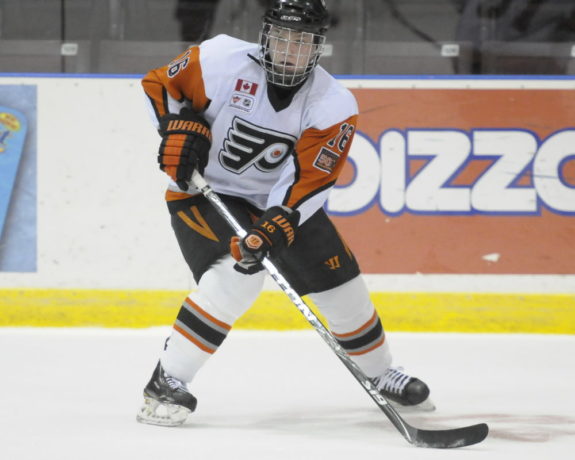
Domi’s health challenges would continue. Two years after the first diagnosis of diabetes, it was discovered that he also had celiac disease, which is an intolerance to gluten. He writes that in many ways, learning how to deal with celiac disease was harder for him and his family to figure out than diabetes. Diabetes requires careful and thoughtful dietary decisions. However, combined with a gluten intolerance, it creates significant challenges with respect to selecting the right foods in order to keep the proper chemical balance. For a young athlete, the level of complexity is magnified further.
He successfully worked through these challenges. In 2011, he was drafted into the Ontario Hockey League (OHL). Doug Gilmour, who was the general manager of the Kingston Frontenacs, originally drafted Domi eighth overall. He was later traded, and his ongoing hockey journey would continue with the London Knights.
The Path to the NHL Draft
Domi made an impact immediately upon his arrival in London. The Knights won the OHL title in consecutive seasons (2011-12 and 2012-13). Unfortunately, the team would fail to claim the Memorial Cup. In 2012, the Knights lost against the host Shawinigan Cataracts in overtime. It was the closest they would come to the Memorial Cup in the four seasons Domi played with the team.

This was a critical period in the lead-up to Domi’s draft year. His health condition was a constant daily challenge. He needed to be very diligent in ensuring that he carefully monitored his blood sugar levels and attentively listened to the signals his body was giving him. He writes in the book that his condition was actually a key factor in his discipline and preparation, realizing in his second year with the Knights, that his condition was actually a strength for him. In the same spirit as the tattoo Domi got at the time, his increasingly acute awareness and ability to deal with his disease was part of an important transformation.
I was starting to see my diabetes as a strength. It kept me focused and made me more responsible than I ever would have been if I didn’t have it. It meant I was always focused on staying ready for the next shift, the next game the next tournament. It gave me drive and purpose.
Max Domi on how he adapted to his condition – excerpt from No Days Off, p. 91
Amidst the disappointment of not winning the Memorial Cup in London, there was a larger stage upon which Domi would claim hockey glory. After being a late cut from Team Canada’s junior national team in Dec. 2013, Domi made the team the following year. Along with Connor McDavid (Edmonton Oilers) as well as linemates Anthony Duclair (Ottawa Senators) and Sam Reinhart (Buffalo Sabres), Team Canada won the gold medal at the 2015 IIHF World Junior Championships. With a gold medal hanging from his neck on the ice at the Air Canada Centre in Toronto, the future looked bright as the next important chapter of his hockey story was being written.
The Howl of the Coyotes
The 2013 NHL Draft in New Jersey featured some very big names. Nathan MacKinnon was the first player selected overall by the Colorado Avalanche. Aleksander Barkov was picked next by the Florida Panthers followed by Jonathan Drouin going to the Tampa Bay Lightning. Domi would have to wait until the 12th spot to finally walk up to the stage and put on a Phoenix Coyotes jersey.
Domi went through two training camps, in 2013 and 2014, but was sent back to London on both occasions. Disappointed, Domi wondered why he could not make the Coyotes lineup. He writes about some key advice given to him by then-head coach Dave Tippett. He suggested that, back in London, Domi should do everything, from practice habits to nutrition, as if he were already a pro. It was the challenge Domi needed.
I’ve always been competitive, so if someone gives me a challenge, I take it. Dave Tippett gave me a challenge for that last year in London, and I embraced it.
Max Domi’s comment on the advice received from Dave Tippett – excerpt from No Days Off, p. 118.
Following Domi’s third training camp, he finally made the team. The objective of becoming an NHL player had finally been accomplished. To mark his arrival and to certify the completion of his childhood dream, Domi also scored in his first NHL game on Oct. 9, 2015, in a 4-1 win against the Los Angeles Kings.
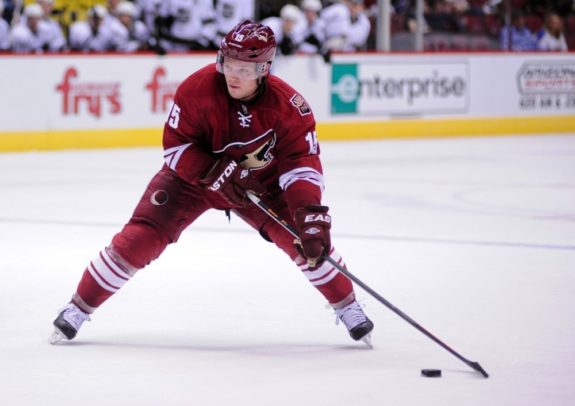
However, winning was not something the Coyotes could do on a regular basis. The team missed the playoff during the three seasons Domi was on the roster (2015-16, 2016-17 and 2017-18). In June 2018, John Chayka, the general manager of the Coyotes, called Domi to let him know that he had been traded to the Montreal Canadiens in a one-for-one deal for Alex Galchenyuk.
Welcome to Montreal
Domi headed north for the much colder and comparatively austere climate of Quebec. However, the excitement of joining an Original Six team more than compensated for the frigid weather he would experience at his new hockey home.
I loved the fact that, in Montreal, hockey was a religion. I didn’t see playing for the Canadiens as pressure – I saw it as a privilege and an opportunity to prove myself and represent something special.
Max Domi on his trade to the Montreal Canadiens – excerpt from No Days Off, p. 192.
The other change for Domi would be numerical in nature. Hanging from the rafters of the Bell Center is the No. 16 of 11-time Stanley Cup winner Henri Richard. So for Domi, the number he had been wearing since he was a child was definitely off-limits. He, therefore, returned to the Sundin-inspired No. 13 on his jersey.
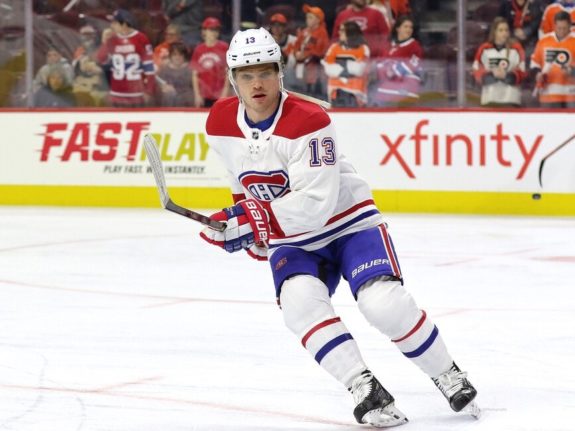
Domi put up career-high numbers in 2018-19, his first season as a Habs player. With a record of 28 goals and 44 assists in 82 games, he surpassed the point production of any of his three seasons with the Coyotes. His 80 penalty minutes was also an indication of the feisty and physical aspect of his game. He has since become a key player for the Canadiens as well as a fan favorite.
An Inspiring Journey
The path to becoming an NHL player is a daunting journey at the best of times. Overcoming a significant and potentially life-threatening medical condition makes that accomplishment even more laudable.
Through the messages in his book, Domi is also helping others. It is a true testament to his giving character and generous approach to life. No Days Off is an inspiring story in and of itself. More significantly, it is a great example of the use of an NHL life to explain that, no matter the obstacle, it is always possible to achieve your objectives, goals and dreams.
Timeline
- Born on March 2, 1995, in Winnipeg, Manitoba
- Diagnosed with Type 1 diabetes in the spring of 2007
- Played junior for the London Knights in the Ontario Hockey League (OHL) from 2011 to 2015 (4 seasons)
- Drafted by the Phoenix Coyotes in the first round, 12th overall in the 2013 NHL Entry Draft
- Won the gold medal at the IIHF World Junior Championships: Jan. 5, 2015
- First NHL game: Oct. 9, 2015 @ Los Angeles Kings, 4-1 win
- First NHL goal: Oct. 9, 2015
- Traded to the Montreal Canadiens: June 2018